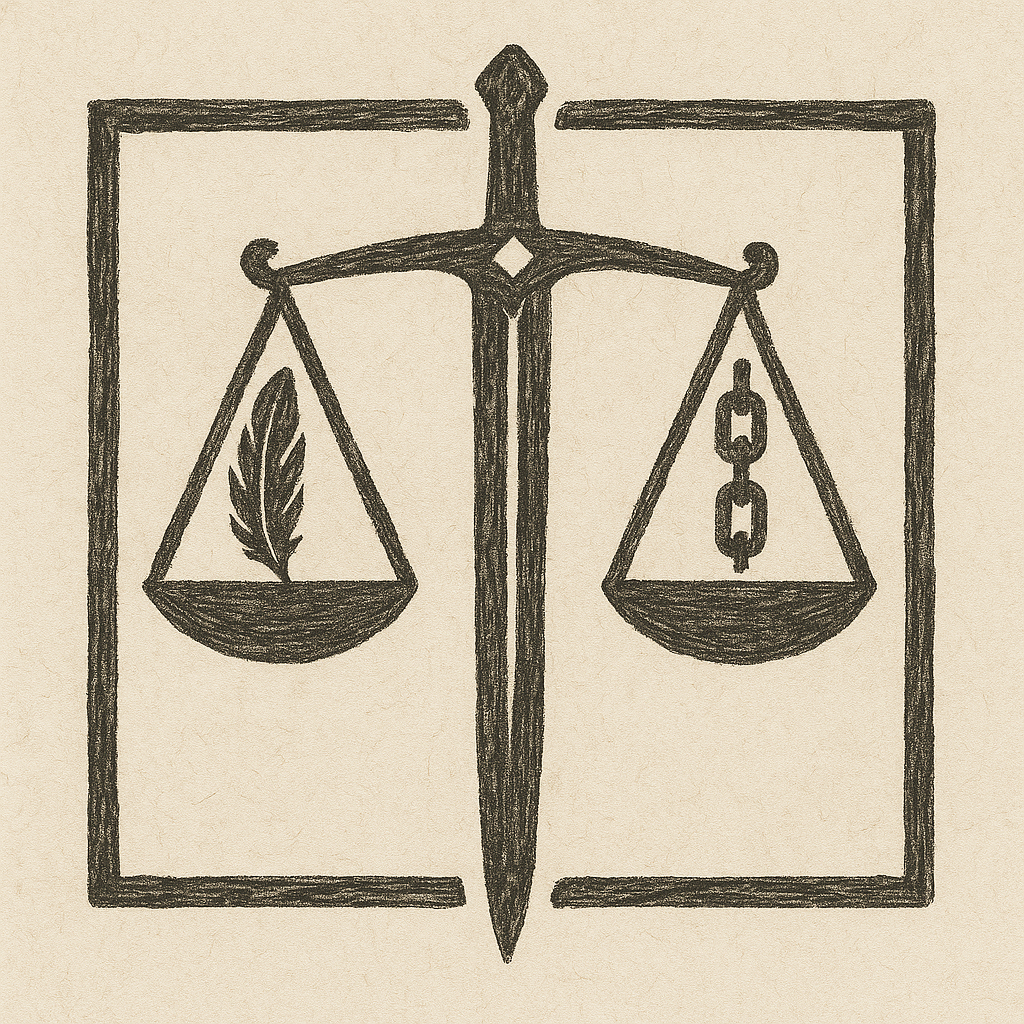Aergethyr
Balance must be kept, even when it breaks you.
Description of the Church
The Church of Aergethyr, often called The Order of the Scales, stands as a bastion of unyielding structure in a world of shifting morality and mortal weakness. Its halls are austere, symmetrical, and immaculately clean, crafted from cold stone and polished iron. Statues of blindfolded arbiters and chained serpents line its corridors. To enter is to step into a place where truth is the only god, and lies dare not whisper.
There are no incense clouds, no joyful hymns—only the steady rhythm of measured footsteps and the scratch of quills on parchment. Silence is considered a form of reverence. Every temple doubles as a courtroom and archive, its walls bearing carvings of foundational laws and famous judgments. Whether in small rural shrines or grand urban halls, justice is practiced, not preached.
The Church views itself not as a ruler of mortals, but a guardian of order—a divine court eternally in session. Its followers are not inspired by ecstasy or awe, but by the sober weight of purpose and duty. They do not forgive lightly, but when they do, it is a formal and sacred act, binding and irreversible.
Core Beliefs
- Law is sacred, the divine structure that separates mortals from chaos.
- Justice must be earned, not assumed—even the powerful must be judged.
- Punishment is not cruelty, but the balancing weight of wrongdoing.
- Oaths and contracts are binding spiritual documents, and breaking them risks divine wrath.
- Mercy is permitted, but must be deliberated carefully—it is not weakness, but a gift.
Religious Structure
- The Order of the Scales is a hierarchical, disciplined organization that governs the Church like a court system.
- The Arbiter Eternal: The highest judicial authority, often a retired High Inquisitor or a scholar of law. They preside over disputes between temples and are considered the living voice of Aergethyr’s justice.
- High Inquisitors: Judges and investigators, assigned to regions or major cities. They are feared and respected, known for thoroughness and incorruptibility.
- Oathbearers: Priests and clerks who administer legal rites, witness oaths, and serve as public notaries and contract sanctifiers. They may also officiate duels of honor.
- Justicars: Holy enforcers—trained in law and arms—who carry out sentences, track fugitives, and maintain order within sacred courts. Think divine bailiff-meets-paladin.
- Initiates of Order: Novices who study philosophy, jurisprudence, and divine punishment. They begin by memorizing the "Codex of Weights," a scripture listing crimes and their penances.
Rituals and Practices
- The Binding Oath: A sacred rite used to seal contracts, marriages, and alliances. Breaking such an oath draws divine scrutiny.
- The Scales Unseen: A private confession ritual. Offenders voluntarily weigh their guilt and, if judged sincere, are given absolution—or are marked for penance.
- Trial by Judgment: A rare but sanctioned combat or trial used when no clear evidence exists. Aergethyr is asked to guide the result.
- Rite of Redress: A formal ceremony where two feuding parties may seek balance. Usually mediated by a High Inquisitor or Oathbearer.
Followers
- Judges, magistrates, and lawmakers who seek divine grounding for mortal law.
- Paladins and inquisitors, dedicated to upholding law and punishing injustice.
- Scribes and record keepers, who preserve the truth in legal and historical texts.
- Common folk who have been wronged and seek justice through formal means.
Temples
Temples of Aergethyr resemble courthouses, fortresses, or civic halls. Most contain at least one:
- Sanctified tribunal chamber
- Hall of Records
- Armory of ustice
They are places of order, silence, and solemnity, where even nobles bow to the letter of law. All temples display the Scales of Stone, a legendary artifact said to weigh the souls of the guilty.
Conflict and Controversy
Frequently clashes with Elustra’s followers, who see Aergethyr’s rigidity as laughable and oppressive.
Mercy cults, especially those of Hiruwen, sometimes argue that Aergethyr’s penalties are too absolute.
Divided internally between:
- Punitive Absolutists (who follow scripture to the letter) and
- Interpretive Reformers (who allow contextual rulings).
Has a strained alliance with Valistal, whose followers may act with passionate valor that sometimes bends the rules.
Relationships with other gods
Central Architect: Aergethyr embodies the cosmic principle of order imposed upon chaos. If Marawae gave form to the gods, Aergethyr gave them structure, codifying divine boundaries and mortal laws alike. Some theologians claim he carved the first glyphs into stone to bind wild thought into justice.
Relationship with Rii-Ella (knowledge): Trusted ally. Rii-Ella records Aergethyr’s edicts and trials with perfect clarity. Together, they maintain the sacred archives that define moral law across realms. Without her, his justice would be ephemeral; without him, her truth would lack teeth.
Rivalry with Elustra (tricks): Open hostility. Elustra subverts Aergethyr’s laws through satire, illusion, and trickery. To Aergethyr, she is a corrosive force that mocks justice, while to Elustra, he represents the folly of rigid systems blind to nuance.

Symbol: A balanced scale set atop a vertical sword, all enclosed in a square. One pan holds a feather; the other, a chain.
Meaning: Judgment through clarity and weight; justice not just in law, but in action.
Areas of Concern: Law, punishment, retribution
Edicts: Uphold balance even when its painful. Speak justice without favoritism. Submit to law, and hold others accountable. Punish with precision, never passion.
Anathema: Breaking oaths or undermining lawful authority.
Divine Attribute: Strength or constitution
Devotee Benefits:
Cleric Spells: 1st: sure strike, 3rd: enlarge, 5th: mind probe
Divine Font: Heal or harm
Divine Sanctification: Can choose holy or unholy
Divine Skill: Intimidation
Domains: Ambition, protection, truth, protection, Alternative: tyranny
Favored Weapon: Longsword



Comments